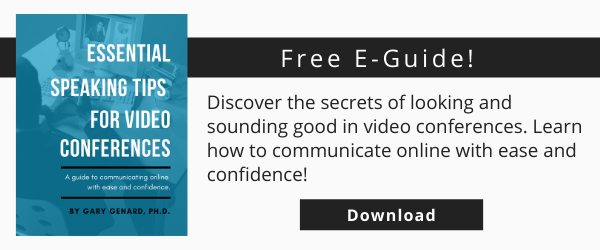
Need a great tool to help you be a more effective presenter? Here's how to use video to boost your speaking credibility and charisma.
Videotaping yourself in practice sessions is a great way to improve your speaking skills. You probably already knew that. (Need to display more confidence as a presenter? Download my free cheat sheet, "How to Calm Your Nerves before Speaking.")
But did you know that practicing with a video camera, tablet or smart phone can give you more of the qualities you'd like audiences to see in you? And help you establish rapport with listeners? And make you more likable?
Not a bad list of benefits for a tool you may carry around daily on your belt or in your purse!
Video Can Help You Look and Sound Good
Some years ago, I ran across a book by David Ball entitled Theater Tips and Strategies for Jury Trials. Mr. Ball is a former theater professional and professor who, in the words of this book's Foreword, "shows trial lawyers how to use concepts from theater to persuade and motivate."[1]One of the ways he accomplishes this in the book is to discuss how attorneys should use videotape to prepare witnesses for testimony. I've always thought the method described is a supportive and creative way to help a client come across—for business as well as testimony—with confidence, credibility, and charisma.
In fact, there's no reason why you can't use the same technique on your own to improve your speaking skills.
So here's a way to use some self-videotaping to A) buttress your skills, B) improve your sense of how you appear to others, and C) strengthen those qualities you like most in yourself as a speaker. Those elements of effective speeches and presentations are the same ones I use in my executive presentation skills coaching and Speak at Your Best! corporate training.
Step One: How to Use Video to Be a Good Speaker
The key to videotaping yourself to improve your speaking skills is not to be too critical until you're good and ready. Sounds reasonable, doesn't it?
To start, videotape twenty minutes or so of your presentation. If that's your entire speech, so much the better; but at any rate don't let it go on too long. Now, before you watch yourself, write down how you would like to be perceived by your audience.
Ball suggests identifying "two or three desirable qualities" (such as authoritativeness or credibility) that you think will work in your favor. Do the same on the other side of the ledger, concerning qualities you'd like to avoid (arrogance, rambling, lack of conviction, and so on). Your goal is to create a list of positive qualities you want to foster in yourself and negatives you want to avoid.
Now watch the video. Stop the tape whenever you spot a quality—positive or negative—that's on your list. This is your complete task during your first viewing. Note that you're not concerned with content; and try not to list qualities that weren't on your two lists. You can take note of them later.
Step Two: Learn to Self-Correct Your Weaknesses
Give your speech or presentation (or the twenty-minute opening segment) again, videotaping yourself a second time. The chances are good that you'll begin to self-correct based on your awareness of the qualities in yourself you want to encourage or diminish that you noticed in your first effort.
Play the tape of Take #2 back right away, noticing any improvement in desirable qualities or diminishment of undesirable ones. Feel free to stop the tape whenever you like, attempting to speak with a good characteristic you didn't think came through clearly enough, or to correct an unfavorable trait. Here, incidentally, are 5 amazing acting techniques to help you connect with audiences in powerful new ways.
Step Three: Achieving Credibility and Charisma
Next, let what you've done so far sink in for a day or two. Then record a third practice session. By now, you should be incorporating the improvements you've been working on. From this point, feel free to note anything concerning content that you'd like to improve. You can also be on the lookout for positive or negative qualities that weren't on your original lists.
Watching yourself like this will give you the "out-of-body experience" you need to understand how others perceive you. After all, that's where credibility and charisma live, not in your own head.
You should follow me on Twitter here.
[1] David Ball, Theater Tips and Strategies for Jury Trials, 3d ed. (Boulder, CO: National Institute for Trial Advocacy, 2003), ix.



